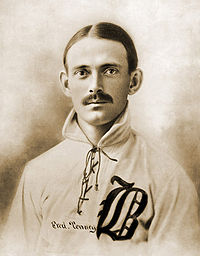Fred Tenney
Baseball player
Frederick Tenney (November 26, 1871 – July 3, 1952) was an American professional baseball player whose career spanned 20 seasons, 17 of which were spent with the Major League Baseball (MLB) Boston Beaneaters/Doves/Rustlers (1894–1907, 1911) and the New York Giants (1908–1909). Described as "one of the best defensive first basemen of all time", Tenney is credited with originating the 3-6-3 double play and originating the style of playing off the first base foul line and deep, as modern first basemen do. Over his career, Tenney compiled a batting average of .294, 1,278 runs scored, 2,231 hits, 22 home runs, and 688 runs batted in (RBI) in 1,994 games played.Born in Georgetown, Massachusetts, Tenney was one of the first players to enter the league after graduating college, where he served as a left-handed catcher for Brown University. Signing with the Beaneaters, Tenney spent the next 14 seasons with the team, including a three-year managerial stint from 1905–1907. In December 1907 Tenney was traded to the Giants as a part of an eight-man deal; after two years playing for New York, he resigned with the Boston club, where he played for and managed the team in 1911. After retiring from baseball, Tenney worked for the Equitable Life Insurance Society before his death in Boston on July 3, 1952.
Personal facts
| Alias (AKA) | Tenney Frederick |
|---|
| Birth date | November 26, 1871 |
|---|
| Date of death | July 03, 1952 |
|---|
